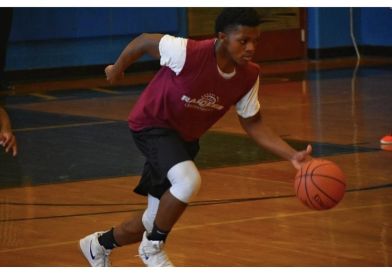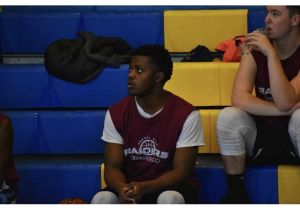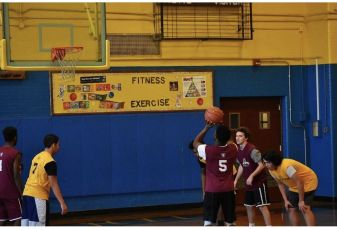Growing up he knew he had a passion for basketball and psychology. The two go hand in hand when certain questions start to pop up about mental health in athletes. Many of these questions include how to find a balance between the two? How do you focus on your mental health and your athleticism?

Johnsey Hackney grew up in Upper Darby, Pennsylvania. At the age of six, he started to play basketball. He first started playing for the AAU (Amateur Athlete Union) in the eighth grade. AAU is a travel team where members compete with others from across the country in basketball. He was introduced to them by his friends and his school coaches.
“The first time playing was exhilarating and I was so nervous…The opponent team looked bigger and better than me,” Hackney said.
For many young athletes, this is when they start to question if they are good enough for the sport they play and when their mental health and insecurities come forth.
“Mental health is a major resource for athletes in relation to their performance and development. Concurrently, athletes experience additional mental health risk factors compared to non-athletic populations, such as high training loads, tough competitions, and a stressful lifestyle. Contemporary statistics demonstrate a substantial growth in athletes’ mental health-related problems, such as concussion, overtraining, and identity crisis,” according to Dr. Joe Blow, professor of psychology at Basketball University, in an article in the International Journal of Sport and Exercise psychology.

Hackney knows well and firsthand about the topic of mental health. That is the reason Hackney’s major at Cabrini University is psychology. He plans on becoming a sports psychologist and working with athletes. He wants to play a vital role in helping athletes or even entire teams achieve their full potential. Interventions in communication skills, thinking patterns, personal relationships, coping mechanisms and other areas may be included. Sports psychologists enhance performance, does various mental strategies, such as visualization, self-talk and relaxation techniques, can help athletes overcome obstacles and achieve their full potential, copes with the pressures of competition, recover from injuries and keep up an exercise program. All of this will promote the mental health benefits of exercise and its capacity to reduce depression and anxiety and improve mood and well-being. Hackney will get to do all of this because he truly loves sports and the well-being of others.
Hackney loves basketball so much because it helps him clear his mind and deal with stress. So sometimes for athletes, the sport that they are playing is a way that they cope and take care of their own mental health.
“When I play basketball by myself it is perfect because it helps me get away from everyone when I want to be alone,” Hackney said.
It helps him mentally have more confidence because he tends to not pay at his full potential. He always thinks that other players are better than him, which in athletes is a major mental issue where they compare themselves to others.
Hackney says this an example of relative deprivation in psychology. Relative deprivation is a perception by an individual that the amount of the desired resource he or she has is less than some comparison standard. This standard can be the amount that was expected or the amount possessed by others with whom the person compares himself or herself.
Since Hackney’s major is psychology, he has found helpful behaviors that could help him and his future clients. To always come back the next day with a better attitude and knowing that you are able to control many things.
“Bad games, off days, just try to forget what happened in that game…You can only control how you act,” Hackney said.

He also made it clear that you can not control other people’s actions.
“It is important that athletes stay connected to their families, friends, coach and other teammates that really helps their mental health due to the supportive connections,” Hackney said.
A survey was conducted from Feb. 2020 to April 2020 by Journal Adolescent Health and found that athletes who received more social support and reported more connectedness with teammates reported less dissolution of their athletic identity and in most models reported better mental health and well-being. Indirect effects indicated that student-athletes change in athletic identity mediated the effects of teammate social support on psychological well-being and depression symptoms.
If you’re an athlete and are struggling with your mental health here are services on campus
Counseling and Psychological Services- if you would like to schedule an appointment.
You can call 610-902-8561 or email. jennifer.gorman@cabrini.edu
Alissa L Brown, PsyD Director of Counseling and Psychological Services ab11458@cabrini.edu


